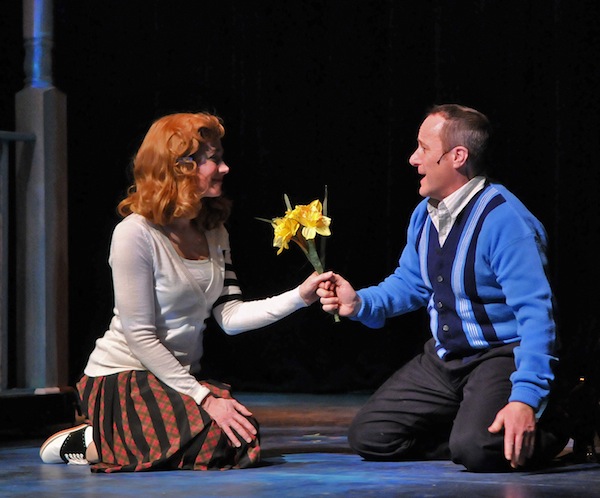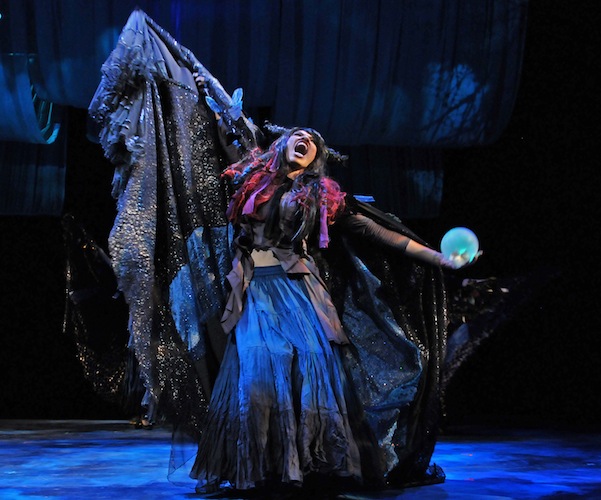Theater Review: A “Big Fish” Out of Water at SpeakEasy Stage Company
The problem is that John August’s book for the musical lacks most of what made his screenplay for the 2003 film so emotionally resonant for so many.
Big Fish. Book by John August, Music and Lyrics by Andrew Lippa. Adapted from the novel Big Fish: A Novel of Mythic Proportions by Daniel Wallace, and the screenplay Big Fish by John August. Directed by Paul Daigneault. Presented by SpeakEasy Stage Company at the Calderwood Pavilion at the Boston Center for the Arts. Boston, MA, through April 11.

Aimee Doherty and Steven Goldstein in the SpeakEasy Stage Company production of “Big Fish.” Photo: Craig Bailey/Perspective Photo.
By Ian Thal
The musical Big Fish, adapted by writer John August and songwriter Andy Lippa from August’s own screenplay for the Tim Burton film of the same name and Daniel Wallace’s 1998 novel Big Fish: A Novel of Mythic Proportions, gets a a lavish visual production from SpeakEasy Stage Company. The images and animations, designed by Seághan McKay, often create fabulously evocative virtual sets of light when projected onto the proscenium and curtains. Elisabetta Polito’s costumes, especially for the mythological creatures and circus performers, are appropriately fantastic. Meanwhile, director Paul Daigneault and choreographer Larry Sousa lead a talented cast through a succession of intriguing tableaux and dances.
The problem, and it is a large one, is that August’s book lacks most of what made his screenplay for the 2003 film so emotionally resonant for so many. You are left scratching your head, wondering why such a flat adaptation had to be concocted, aside from the ‘Wicked’ economic pressures of name recognition. It was a successful book and movie — why not make a musical and see how much more can be wrung out of the material?
Big Fish is off to a confused start from its first song, “Be The Hero.” The tune is a derivative pastiche of a genre that is supposed to inspire children to read and cultivate their imaginations. But rather than open young minds to the amazing world of literature (e.g. the theme song of the popular children’s show Reading Rainbow), the song comes right after Edward Bloom (Steven Goldstein) disappoints his son Will (Jackson Daley) by refusing to read The Iliad to him. Containing lines like “You don’t need to be a novelist / to make believe what’s waiting ’round the bend,” the song turns out to be a homage to the great adventures one can have by not reading. The anti-literacy message seems unintentionally ironic considering that the novel and the film are both self-aware in their indebtedness to both The Odyssey of Homer and James Joyce’s Ulysses (the surname “Bloom” is no coincidence).
As the show moves along, the abrupt alternation between scripted scenes and musical set pieces soon becomes confusing, so disjointed that familiarity with the film is most likely needed to follow the storyline. Even the characters are called in at one point to help tidy matters up. Rather than playing out any of Edward’s tall tales so that their life lessons become clear, the adult Will (Sam Simahk) and his wife Josephine (Katie Clark) are given a scene in which they try to apply Joseph Campbell’s schematic mono-myth to the set pieces. But even they have give up – another set piece pushes them aside! Burton may not be the most subtle filmmaker, but at least he was at the height of his powers when he made Big Fish (for many fans his work has since been on the decline). He understood how to evoke mythology to great effect, something lacking in this prosaic adaptation.
The stage adaptation occasionally borrows from the screenplay, though not consistently enough to generate much rhyme or reason. Here the emotional lives of the characters are rather two-dimensional. The rift between father and son, which drives the dramatic conflict in the film’s frame story, becomes little more than Edward the fabulist versus Will the fact-loving journalist. This turns their respective wives, Sandra (Aimee Doherty) and Josephine, into little more than plot devices.

Aubin Wise as the Witch in the SpeakEasy Stage Company production of “Big Fish.” Photo: Craig Bailey/Perspective Photo.
The musical, perhaps because it is a product of brand synergy, also ignores a secondary theme of the film: its celebration of the strange and idiosyncratic in the face of business-degreed conformity. The latter issue was a concern of Burton’s before and after he himself became a marketed Hollywood ‘name,’ a genre unto himself, stretching back to when he first made a star out of Pee-Wee Herman and then to his recurring visions of Christmas as a saccharine buy-a-thon and his elevation of Halloween into a night of benign misrule. In the film, the town Edward saves is a community of once happy shoeless eccentrics threatened by the corporate privateering of the Reagan era; in the musical, it’s the small-minded people of his hometown who are too foolish to notice that new dam construction is going to flood their municipality until the threat is imminent. (Edward just advises them to move and helps them pay for the relocation – so much for the just compensation of eminent domain.)
Andrew Lippa’s score recycles every cliché of American musical theater of the 1970s – right down to the patriotism-lite ditty “Out There on the Road.” “Little Lamb from Alabama” is an acceptable pastiche of the faux-regionalism that Tin Pan Alley sold in the pre-rock’n’roll era, but the only musical highlight is “The Witch,” which eschews the technicolor lushness around it. Aubin Wise’s bluesy rendition is terrific, but the racial subtext of the number is questionable because this is the only place in the score where African-American musical traditions are put front and center. Yes, the blues is filled with stories about necromancy, fortune-telling, death, and the devil – but so is bluegrass and other traditional music of southern whites.
Is Big Fish the musical cursed? Was a theater adaptation of the film adaptation of the novel necessary? Why stage in Boston a musical which limped through its 2013 Chicago tryout and staggered through its short Broadway run? The admittedly lucrative opportunity presented by cross-platform brand identity can blind creators to what may have made a franchise special in the first place – and neither a skilled cast nor talented designers can hide the fact that this Big Fish, pulled out of its native waters for quite a while now, has begun to stink.
Ian Thal is a playwright, performer and theater educator specializing in mime, commedia dell’arte, and puppetry, and has been known to act on Boston area stages from time to time, sometimes with Teatro delle Maschere. Two of his short plays appeared in theater festivals this past summer. He has performed his one-man show, Arlecchino Am Ravenous, in numerous venues in Massachusetts and Rhode Island. One of his as-of-yet unproduced full-length plays was picketed by a Hamas supporter during a staged reading. He is looking for a home for his latest play, The Conversos of Venice, which is a thematic deconstruction of Shakespeare’s The Merchant of Venice. Formerly the community editor at The Jewish Advocate, he blogs irregularly at the unimaginatively entitled From The Journals of Ian Thal, and writes the “Nothing But Trouble” column for The Clyde Fitch Report.
